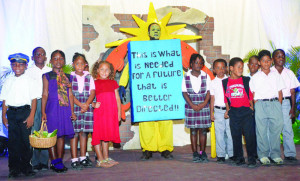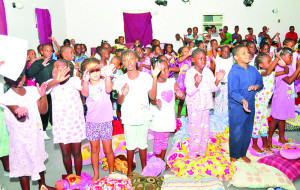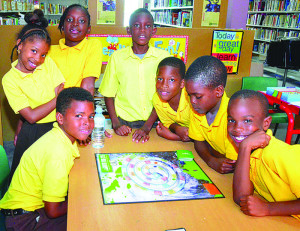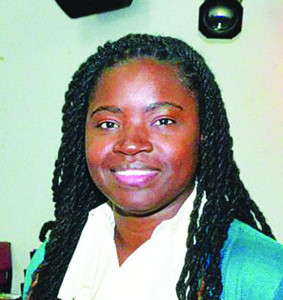

 Inside Education is a monthly column established by the Ministry and Department of Education. The column showcases various aspects of the education system and provides an inside look at those accomplishments which often go unnoticed.
Inside Education is a monthly column established by the Ministry and Department of Education. The column showcases various aspects of the education system and provides an inside look at those accomplishments which often go unnoticed.
In the Education Development Plan 2010 to 2015, the Ministry and Department of Education identified literacy development as the top priority for the education sector. To assist in the realisation of the literacy targets, the Ministry launched a literacy promotion campaign to raise awareness of this national issue and encourage home and community involvement. Subsequently, the services of Mrs Vanessa Hobson nee John were secured as Literacy Champion to spearhead the literacy efforts, coordinate the implementation of the Literacy Policy and train, support, monitor and evaluate teachers in the delivery of literacy lessons. Mrs Hobson, a former Miss Anguilla, is not only a talented beauty, but is well respected as an educator in this field. She is a certified teacher, holds a Bachelor of Arts Degree in Literatures in English from the University of the West Indies (UWI) and is currently pursuing a Masters Degree in Literacy Instruction from UWI. Mrs Hobson taught English Language and Literature at the CXC CSEC General Proficiency level and History, Communication Studies and Prose at the CXC CAPE level for several years. Since September 2012, Mrs Hobson has been deployed at the Department of Education working assiduously on training programmes and other initiatives to improve literacy levels in schools.
For our feature this month, Mrs Hobson provides some insight into the efforts being made to promote literacy development in schools. Several initiatives have been implemented under her watch, but annual ones include:
 • Jymjams Jamboree, an event for Grade Two Students. Students are given the opportunity to participate in a variety of fun literacy related activities such as storytelling, mathematics, riddles, etc. According to Mrs Hobson, it’s like a huge Literacy Slumber party, as they are dressed in their pyjamas.
• Jymjams Jamboree, an event for Grade Two Students. Students are given the opportunity to participate in a variety of fun literacy related activities such as storytelling, mathematics, riddles, etc. According to Mrs Hobson, it’s like a huge Literacy Slumber party, as they are dressed in their pyjamas.
• Literacy Fair which targets Grade Four students. Students are exposed to a writers’ workshop session where they complete writing assignments using given prompts, readers’ theatre in which they bring a script to life based on their interpretation and performance of it, art and craft activities which require them to follow instructions closely and treasure hunt which hones their problem solving skills.
• In Living Colour, an event in which Grade One students dramatise their adaptation of a well known fairy tale.
• The summer catch-up programme in which students who are reading one year below the level expected for their age are provided targeted and intense literacy instruction over a specific period.
According to Mrs Hobson, what has been most rewarding in her role as Literacy Champion is the improved performance on national tests Additionally, her satisfaction comes from “knowing that … we are equipping students with the knowledge and skills they will need to function effectively in this rapidly changing world [and] seeing that teachers embrace their role in this entire process and are committed to raising literacy levels.”
However, the gains being made did not come without challenges. Mrs Hobson pointed out that one of the initial challenges was the limited view of literacy that parents and some teachers subscribed to. They saw it simply as the ability to read and write. To tackle this misconception, developmental sessions were used to present teachers with a more comprehensive view of literacy. It was also important to ensure that Literacy Coordinators (lead literacy teachers at schools) embraced the new definition of literacy and were therefore able to reinforce this among teachers. Another challenge was the students’ lack of motivation to read. However, Mrs Hobson did not allow this challenge to deter her efforts. Rather, schools were encouraged to establish incentives for reading. She also used her creativity to spearhead the organisation of activities that make reading fun, including the introduction of Literate Lincoln the literacy mascot, and procured a variety of reading material for classroom libraries.
With this renewed focus on literacy, Mrs Hobson is confident that strides are being made. “Literacy is no longer viewed negatively. Now when I visit primary schools and ask who likes to read, more hands are raised. A new curriculum has been piloted in the upper grades. It foregrounds the Literacy Strategy and seeks to place equal emphasis on the core Language Arts Skills.”
It is recognised though, that parents need to play a greater role in literacy development of their children. They can do this in simple ways such as allowing children to help with the grocery list, exposing them to technology, engaging children in frequent, meaningful conversation, reading to them, letting the children see them reading and ensuring the home environment is literacy rich. Parents can also offer assistance to teachers by establishing reading programmes, book clubs, drama clubs etc.
Though much has been accomplished, there is still much to be done. For 2015, the focus will be on:
• Training for teachers in areas that prove problematic for students (eg Composition Writing and Comprehension)
• Greater use of social media as a means of making wider community aware of its role in raising literacy levels
• Choral Speaking Competition
• Additional work on Literacy Curriculum
The Ministry and Department of Education are committed to ensuring that efforts made to improve literacy continue to bear fruit. We are grateful to Mrs Vanessa Hobson for her work to date and the work being done by Mrs Jacqueline Jeffrey Connor, Education Officer Multi-Professional Support Services for her work in supporting literacy intervention programmes. Thanks are extended to them for their commitment and to the Curriculum Development Unit for its support and guidance.
Please join us next month for another edition of Inside Education.








